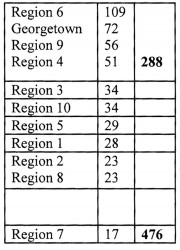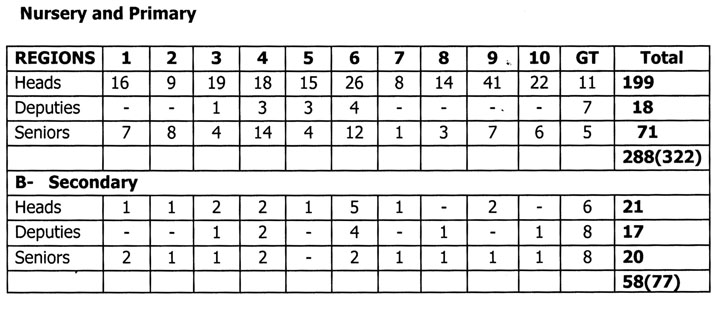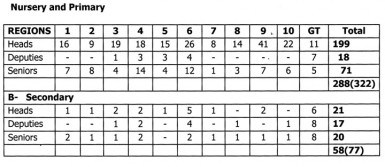Dear Editor,
In February this year the Teaching Service Commission published its annual vacancy
list of more than 500 senior positions, in 2013. One must wonder about how long some of the (current) vacancies existed, given the critical importance of these leadership/management positions in the education system.
Generally the absences of these most valuable resources are dispersed across the regions as shown in tables A and B below.
Of the 288 vacancies of senior/management positions in the nursery and primary schools combined, 199 are shown to be the headmasters and headmistresses, ie 69%. The concern must be about how so many top positions can be filled within a timely period; in addition to the implications for consequential appointments, should most of those positions actually get filled.
At this foundation level of the education system the reduction in vacancies reflected above ‒ 10.5 % ‒ hardly provides cause for comfort.
Table B
 There may be need to analyse why two major regions like Georgetown and Region 6 should have proportionately the highest number of vacancies – 22 and 11 respectively. The situation is compounded in those two regions where the vacancies at nursery and primary levels are respectively 23 and 42 ‒ a grand total of 45 and 53 respectively.
There may be need to analyse why two major regions like Georgetown and Region 6 should have proportionately the highest number of vacancies – 22 and 11 respectively. The situation is compounded in those two regions where the vacancies at nursery and primary levels are respectively 23 and 42 ‒ a grand total of 45 and 53 respectively.
The total of 35 vacancies at this foundation level in Region 4 should also not be overlooked.
With regard to specialist subjects, in 2012 the subject Minister had specifically expressed concern about the shortage of delivery capacity in three specialist areas which had to be addressed: Mathematics, Science and Agricultural Science.
According to the vacancy list the priority areas to be filled would appear to be: English – 20; Home Economics – 18; Business Education – 16; and Social Studies – 12.
Overall the range of total vacancies across the regions is in the order shown in the table at left:
There needs to be serious examination of the respective situations in Regions 4, 6, 9 and Georgetown, which together account for just 65% of the vacancies. The prospect of the consequential impact on the quality of the products delivered by the education system, suggests the urgent need for intense restrategising by the relevant stakeholders, ie the Teaching Service Commission, Guyana Teachers Union, related training institutions – Cyril Potter College of Education and the University of Guyana ‒ monitored by public and private sector employers, with the aim of developing a more proactive and creative response to what may have become a chronic dilemma.
The rigidities which the Teaching Service Commission applies to the promotional process (see SN, February 10) hardly provide incentive to perhaps the most poorly paid group of public servants to stay the professional course. But for those who may have missed the publication, the following are excerpts of the criteria that must be satisfied:
Criteria for Making appointments to Send Posts On schools, 2013
“Every teacher who applies for and is offered a senior post is expected to live within easy reach of the school. This condition is intended to facilitate placement for effective school performance. This will allow too, participants as much as possible in the activities of the community.”
“Except for posts of Head of Department for which Untrained Graduates may apply, only teachers who have attained trained status are eligible to apply for promotion to any senior post in the Nursery, Primary, Secondary and Practical Instructions Centres.”
“Except where specifically provided for hereinafter, teachers who have attained trained status and untrained Graduates (in the case of posts of Head of Department) who wish c) to apply for promotion to a post in a level in which they are not working (that is Nursery, Primary and Secondary) must go on transfer/secondment and teach at least two (2) continuous years in that level before being considered eligible for promotion to a post in that level.
“In calculating the years of service, the applicant should include the period up to August 31, 2013.
“Wherever the Eligibility Criteria require that a certain minimum number of years must be spent in a post, such number of years of service must have been given within the (5) years immediately preceding closing date of application.
“A teacher who is attending classes at UG will not be considered eligible for promotion while attending UG EXCEPT:
(a) Those Teachers pursing Post Graduate Programmes (Diploma/Masters in Education which are approved by the Ministry of Education)
(b) Final year student of UG. (All such promotions will be conditional, pending confirmation of graduation).”
What seems curious about the whole process is that no mention is made of performance; even though there is a well-articulated system established by the Teaching Service Commission, but the consistent implementation of which invites enquiry.
What also must continue be a source of frustration to heads (and deputies where applicable) is the obduracy exhibited towards providing suitable residential accommodation in certain regions, as if these personnel are not entitled to normal domestic lives, rather than being the sacrificial lambs as they are treated – a virtual assault on morale that is likely to be transmitted to students.
Yours faithfully,
E B John







